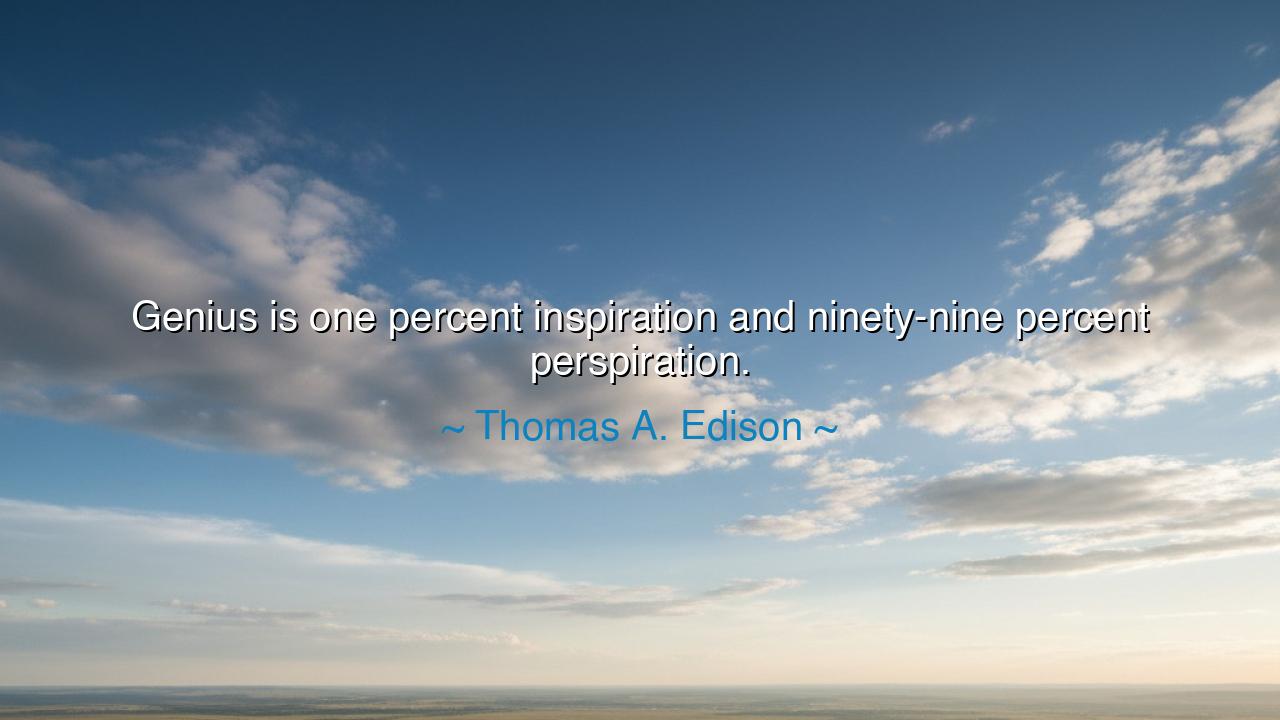
Genius is one percent inspiration and ninety-nine percent






The words of Thomas A. Edison, “Genius is one percent inspiration and ninety-nine percent perspiration,” thunder like a commandment to all who dream of greatness. He strips away the illusion that genius is born from divine flashes alone. Inspiration may ignite the flame, but it is the relentless fuel of labor, the sweat of unceasing effort, that allows it to burn bright. True greatness is not a gift freely given, but a prize wrested from struggle, repetition, and endurance.
The ancients knew this truth though they clothed it in different words. The Greeks spoke of arete, the excellence achieved not by chance, but by disciplined practice. The Romans admired virtus, born of toil, sacrifice, and perseverance. A sculptor might see the image of a god within marble, but only by hammering day after day would that vision take form. Thus Edison's wisdom stands with theirs: that the one who sweats and strives shapes his destiny, while the dreamer who will not labor remains forever barren.
History proves this in Edison’s own life. He did not invent the lightbulb in a single stroke of brilliance, but through thousands of experiments—failures stacked like stones until one became a foundation. The world saw the spark of inspiration; Edison knew it was the mountain of perspiration that made the spark endure. His story is the story of every craftsman, builder, and leader who has transformed vision into reality by the stubborn force of work.
So too, we see this truth in the life of Michelangelo, who lay for months on scaffolds painting the Sistine Chapel. Inspiration gave him the vision, but sweat, pain, and labor gave the world the masterpiece. Without endurance, the ceiling would remain only a dream in the artist’s mind. The works that endure through ages are born not from comfort, but from the discipline of perspiration.
Let the generations remember: greatness is not a gift carried on the wind, but a fortress built stone by stone. Inspiration is the whisper of the muse, but perspiration is the weapon with which the whisper becomes a roar. He who longs to achieve must embrace the toil, the grind, the endless hours of unseen labor. For in truth, it is not the flash of genius but the sweat of endurance that lifts mortals into immortality.






MHNgo My Hoan
I love this idea, but I also feel like it oversimplifies things a bit. Sure, hard work is key, but isn’t there also something to be said for timing, opportunity, and circumstances? Sometimes, no matter how hard we work, we don’t have the resources or support to reach the heights others might. How much does external factor play into someone’s success, and how do we separate that from sheer effort?
Ddyn
This quote reminds me of how so much of success is about consistency and effort, not just inspiration or the ‘lightbulb moment.’ But is it really true that talent or inspiration plays such a small role? Sometimes, it feels like the most successful people had a combination of both—creative sparks and the perseverance to follow through. How do we recognize and nurture that balance? Does one really outweigh the other in the end?
TDNguyen Thanh Danh
Edison’s perspective on genius makes me think about how society often celebrates talent without recognizing the effort behind it. I’ve known many talented people who didn’t put in the work and, as a result, didn’t reach their potential. But is it possible for someone without natural talent to achieve the same level of success with pure hard work? Or are there limits to how much effort can compensate for lack of ability?
TPThu Pham
This quote speaks to the power of determination and hard work, which I admire. It also makes me wonder: if it’s all about hard work, what happens when we hit a wall or burnout? At what point does effort stop being productive and start becoming detrimental? Is there a balance between inspiration and perspiration, or do we just have to push through the tough times, no matter what?
APLinh Anh Phan
I really like this quote because it puts emphasis on hard work over raw talent. So many people romanticize the idea of genius, but Edison makes it clear that it’s persistence and effort that truly matter. But does this mean that anyone can achieve greatness with enough effort, or are there certain innate qualities that some people have, like creativity, that simply can’t be taught or developed? Can sheer hard work replace natural talent?